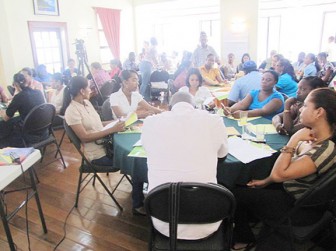Labour Minister Manzoor Nadir and Senior Project Manager for the One Laptop Per Family (OLPF) Sesh Sukhdeo yesterday met with over 50 staffers who would be working at the project hubs.
The initiative, a Government Information Agency (GINA) release said, was aimed at strengthening customer relations when addressing issues and concerns with regards to specifications. It was held at Duke Lodge.
Nadir was quoted as saying that the session would better equip the staff for the roll-out of the first phase of the project, which will see 27,000 households benefiting from the distribution exercise after a verification exercise of over 15,000 people is completed.

Among the first to benefit from the programme will be single parents; differently-abled; low income earners, including students who receive subsidy from CXC, and organised community groups.
“This is now getting into full steam and it can’t happen without fully trained and organised staffers. There is going to be also a focus on the resources that we need to mobilise and we will also be putting close to 120 people in the field in the next two weeks to accomplish this task,” Nadir said.
“The PPP/C administration’s vision is to ensure that this knowledge society is driven by a people with the greatest access to the internet, particularly any form of ICT and the OLPF is a small part in the ICT strategy,” he said.
Meanwhile, Sukhdeo told the staff that each one of their portfolios is critical to the success of the programme, since they are responsible for its delivery.
While the objective is to provide information to the public, he said that this must be done in a professional manner which will be reflective of the organisation’s culture.
“As you conduct your work it is important how to answer questions and interact with the public, since everyone that you come in contact with is your customer and it is your duty to ensure that the system works well.”
While a training exercise will be done with the aim of ensuring that every member of the household develops computer skills, the verification process is also important as it will ensure that information provided by an applicant is accurate.
The project is slated to be carried out over a two-year period and will see 90,000 laptops being handed over to households.





